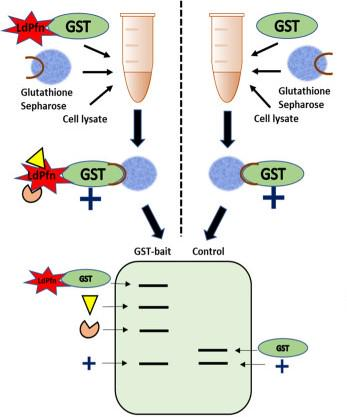Pull-Down Assay Service
The pull-down assay is an in vitro technique used to detect protein-protein interactions. This method can be employed to confirm interactions between two known proteins or to screen for unknown proteins interacting with a known protein. The fundamental principle of the pull-down assay service involves immobilizing a tagged fusion protein onto an affinity resin to serve as the "bait protein." When the tagged fusion protein is incubated with the target protein, tissue, or cell lysate, the proteins that specifically interact with the bait protein are captured. After multiple washing steps, the incubation system retains only the bait protein immobilized on the resin along with the target proteins bound to it. The captured protein complexes are then analyzed using Western blot or mass spectrometry to validate predicted protein-protein interactions or discover new interactions.
The pull-down assay service leverages the specificity and affinity of protein-protein interactions. By selecting appropriate tags and experimental conditions, this method provides accurate insights into how protein interactions influence cellular functions and other mechanisms. It is mainly used in many fields such as molecular biology, biochemistry, immunogenetics and biomedical research.
Analysis Workflow
1. Preparation of Bait Protein
The target protein is fused with an affinity tag using recombinant DNA technology. The expression is induced, and cells containing the fusion protein are collected, lysed, and the fusion protein is purified.
2. Immobilization of Bait Protein
The purified fusion protein is incubated with affinity resin, allowing the fusion protein to be immobilized onto the resin.
3. Preparation of Lysate
Cells or tissues to be screened are collected, lysed to prepare the lysate, and centrifuged to remove insoluble particles.
4. Incubation with Lysate
The resin-bound bait protein is mixed with the cell lysate and incubated for sufficient time to allow all potential interactions to occur.
5. Elution
Specific elution buffers or conditions are used to elute the protein complexes bound to the resin.
6. Analysis
The eluted protein complexes are subjected to Western blot analysis or mass spectrometry to identify interacting proteins.

Ambaru, B. et al. PLoS One, 2022.
Figure 1. Principle of Pull-Down Assay (GST as an Example)
Key Factors in Pull-Down Assay
1. Selection of Expression Vectors and Host Cells
Choose suitable expression vectors to ensure the correct fusion of the tag with the target protein. Use efficient expression host cells (e.g., Escherichia coli DH5α or BL21) to achieve high levels of target protein expression.
2. Induction Conditions
Use IPTG as an inducer, carefully controlling its concentration and induction time to maximize the yield of fusion proteins. Optimize incubation temperature and duration, typically incubating at 37°C for 3–4 hours.
3. Cell Lysis and Protein Purification
Use lysis buffer containing Triton X-100, DTT, and protease inhibitors to ensure complete cell lysis and inhibit protease activity. Apply ultrasonic disruption with controlled power and duration to prevent protein degradation.
4. Washing
Wash beads thoroughly to remove non-specifically bound proteins, typically performing 3–5 washes.
Considerations for Pull-Down Assay
1. Avoiding Protein Degradation
Add DTT and protease inhibitors to the lysis buffer to minimize protein degradation. Shorten operation time to prevent proteins from prolonged exposure to unfavorable conditions.
2. Preventing Non-Specific Binding
Wash beads sufficiently to remove non-specifically bound proteins. Include a blank control (without fusion protein) to identify and exclude non-specific binding.
3. Optimizing Incubation Conditions
Control incubation time to ensure sufficient binding between the target and fusion proteins. Perform incubation at 4°C to prevent protein denaturation at higher temperatures.
4. Western Blot and Mass Spectrometry Analysis
Use specific antibodies for Western blot to confirm interactions. Optimize mass spectrometry conditions to ensure accurate identification of target proteins.
5. Repeatability and Reproducibility
Repeat experiments multiple times to ensure reliability and reproducibility. Standardize experimental protocols to minimize human error.
Services at MtoZ Biolabs
The pull-down assay service provided by MtoZ Biolabs allows for different experimental protocols for different samples, combined with the validation of known interactions between two proteins by western blotting or mass spectrometry analysis, to be used for the detection of specific proteins, it is also possible to search for unknown proteins that interact with known proteins.
Service Advantages
1. Advanced Analytical Platform
MtoZ Biolabs has established pull-down assay service platform to ensure reliable, efficient, and high-precision analysis services.
2. Transparent Pricing
Our pricing is transparent, with no hidden or additional fees.
3. Custom Research Solutions
MtoZ Biolabs offers customized services to address your specific research questions and experimental requirements.
Sample Submission Suggestions
1. Sample Types
We accept microbial, animal, and plant tissue or cell samples. Samples should be properly preserved to maintain protein integrity and spatial distribution.
2. Sample Amount
Prepare at least three biological replicates.
Note: Please contact us if you have special requirements or need assistance with sample preparation.
Deliverables
1. Comprehensive Experimental Details
2. Materials, Instruments, and Methods
3. Comprehensive results report
4. Raw data files
MtoZ Biolabs, an integrated Chromatography and Mass Spectrometry (MS) Services Provider, provides advanced proteomics, metabolomics, and biopharmaceutical analysis services to researchers in biochemistry, biotechnology, and biopharmaceutical fields. Our ultimate aim is to provide more rapid, high-throughput, and cost-effective analysis, with exceptional data quality and minimal sample consumption. Free project evaluation, welcome to learn more details!
MtoZ Biolabs, an integrated chromatography and mass spectrometry (MS) services provider.
Related Services
Protein-Protein Interaction Analysis Service
Fusion Protein Interaction Analysis Service | Pull-Down and MS
How to order?







